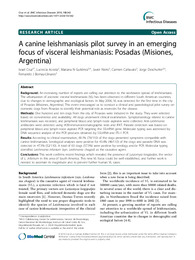Por favor, use este identificador para citar o enlazar este ítem:
https://hdl.handle.net/11000/34328
A canine leishmaniasis pilot survey in an emerging focus of visceral leishmaniasis: Posadas (Misiones, Argentina)
Título :
A canine leishmaniasis pilot survey in an emerging focus of visceral leishmaniasis: Posadas (Misiones, Argentina) |
Autor :
Cruz, Israel 
Acosta Soto, Lucrecia 
Nieto Martinez, Francisco Javier 
Cañavate, Carmen
Deschutter, Enrique Jorge 
Bornay Llinares, Fernando Jorge  |
Editor :
BioMed Central |
Departamento:
Departamentos de la UMH::Agroquímica y Medio Ambiente |
Fecha de publicación:
2010-12-01 |
URI :
https://hdl.handle.net/11000/34328 |
Resumen :
Background: An increasing number of reports are calling our attention to the worldwide spread of leishmaniasis. The urbanization of zoonotic visceral leishmaniasis (VL) has been observed in different South American countries, due to changes in demographic and ecological factors. In May 2006, VL was detected for the first time in the city of Posadas (Misiones, Argentina). This event encouraged us to conduct a clinical and parasitological pilot survey on domestic dogs from Posadas to identify their potential role as reservoirs for the disease. Methods: One hundred and ten dogs from the city of Posadas were included in the study. They were selected based on convenience and availability. All dogs underwent clinical examination. Symptomatology related to canine leishmaniasis was recorded, and peripheral blood and lymph node aspirates were collected. Anti-Leishmania antibodies were detected using rK39-immunocromatographic tests and IFAT. Parasite detection was based on peripheral blood and lymph node aspirate PCR targeting the SSUrRNA gene. Molecular typing was addressed by DNA sequence analysis of the PCR products obtained by SSUrRNA and ITS-1 PCR. Results: According to clinical examination, 69.1% (76/110) of the dogs presented symptoms compatible with canine leishmaniasis. Serological analyses were positive for 43.6% (48/110) of the dogs and parasite DNA was detected in 47.3% (52/110). A total of 63 dogs (57.3%) were positive by serology and/or PCR. Molecular typing identified Leishmania infantum (syn. Leishmania chagasi) as the causative agent.
|
Palabras clave/Materias:
Leishmaniasis
Domestic dogs
Parasite detection
Leishmania infantum
Leishmania chagasi |
Tipo de documento :
info:eu-repo/semantics/article |
Derechos de acceso:
info:eu-repo/semantics/openAccess
Attribution-NonCommercial-NoDerivatives 4.0 Internacional |
DOI :
https://doi.org/10.1186/1471-2334-10-342 |
Publicado en:
BMC Infectious Diseases volume 10, Article number: 342 (2010) |
Aparece en las colecciones:
Artículos Agroquímica y Medio Ambiente
|
 La licencia se describe como: Atribución-NonComercial-NoDerivada 4.0 Internacional.
La licencia se describe como: Atribución-NonComercial-NoDerivada 4.0 Internacional.

 La licencia se describe como: Atribución-NonComercial-NoDerivada 4.0 Internacional.
La licencia se describe como: Atribución-NonComercial-NoDerivada 4.0 Internacional.
.png)